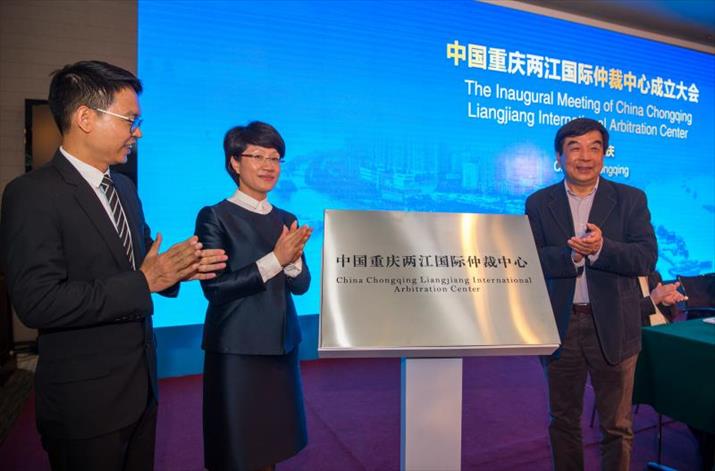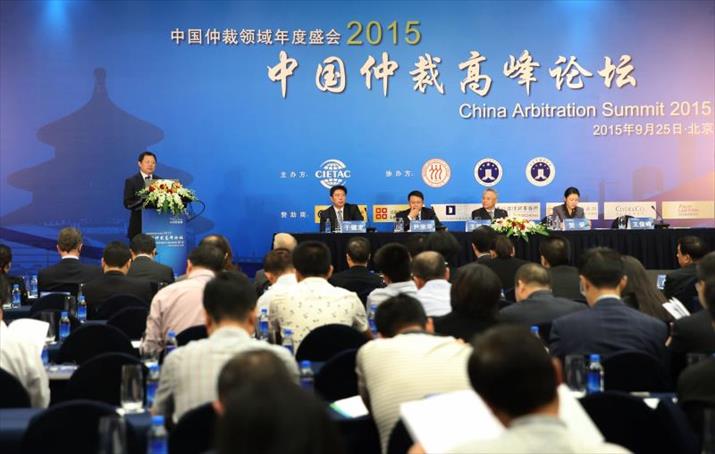| Business |
| Settling out of Court | |
| More businesses are turning to arbitration for faster, low-cost dispute resolution | |
|
|
 The China Chongqing Liangjiang International Arbitration Center is set up on April 28, 2016, to provide legal services to domestic and foreign businesses in west China (XINHUA)
Lin Zhiwei likes to quote a saying common in legal circles: decisions by the supreme courts of China and the United States might not be executed, but awards issued by arbitration courts will always be. That's because, as Lin, Secretary General of Beijing International Arbitration Center (BIAC), explains, today 158 governments, including China, have signed the Convention on the Recognition and Enforcement of Foreign Arbitral Awards, also known as the New York Convention. It means the signatories will enforce the decisions made by one another's arbitration authorities, and an award by a Chinese arbitrator will be honored in the United States despite the differences in their legal systems. "Arbitration is becoming a national strategy and is being adopted by many members of the business community," Lin said. "Awards are internationally enforceable, as stipulated in the New York Convention. Also, big companies especially want to keep their disputes secret. Arbitration proceedings are confidential." The first arbitration law in China became effective on September 1, 1995. Today, there are over 200 arbitration centers in the country, which have nearly 500 arbitrators. The backlog of cases in courts is another reason businesses head for arbitration centers. In 2016, BIAC arbitrated in 3,000 disputes with the total money involved reaching 40 billion yuan ($5.8 billion). This is a significant increase from five years ago, when it handled around 1,000 disputes involving about 10 billion yuan ($1.45 billion). Arbitration's edge "Now even courts prefer that business disputes are handled by arbitration centers," Lin said. "The centers are under less pressure than courts. Besides, arbitrators are qualified legal experts like famous professors from prestigious universities who also have expertise in the industry in which the disputes arise, like infrastructure, and stakeholders have trust in them. Trust is the most important thing." In their 2008 study, International Arbitration in China, Howard Chen and Shu Yujing, partners at law firm K&L Gates, remarked that China was accepted or even recommended as the place of arbitration (if it involved property in China) for several reasons. China had established a legal framework for its market economy, the legal system had become more transparent after China joined the World Trade Organization, and the arbitrators were more knowledgeable and experienced than earlier. Gu Zhaomin, Director General of the International Department of China Law Society (CLS), the official organization of Chinese legal professionals that advises the government on legal issues, thinks the role of arbitration has increased with the announcement of the Silk Road Economic Belt and 21st-Century Maritime Silk Road (Belt and Road Initiative). "The main purpose of the Belt and Road Initiative is to promote cooperation in trade and investment, people-to-people contacts, and cultural exchanges among countries along the trade routes," Gu said. "Arbitration is a very useful and efficient way to resolve disputes arising from trade cooperation. Low cost and high efficiency is another feature." In the past, businesses went to Europe to resolve cross-border disputes. "But there were complaints that it took too long to do the arbitration in some European cities and it also cost a lot," Gu said. That led to the thought of establishing arbitration centers closer to home.  The China Arbitration Summit is held on September 25, 2015 (XINHUA)
The African angle China's arbitration history witnessed a major development in 2015. "Though we have legal cooperation with many countries, China-Africa legal cooperation is a step ahead," Gu said. In 2015, two arbitration centers dedicated to resolving Sino-African commercial disputes were opened. The development came after China became Africa's largest trading partner in 2009, overtaking the EU and the United States. As the volume of trade and investment grew, so did disputes, and it was felt that a special legal mechanism was needed to focus on Sino-African business dispute resolution. Consequently, the dedicated China-Africa joint arbitration centers (CAJACs) were established in Shanghai and South Africa's Johannesburg. On March 27, two more CAJACs were opened in Beijing and Kenya's Nairobi, followed by a third in Shenzhen two days later. "The intention of CAJAC is to create an arbitral family for China and Africa to resolve Chinese and African business, construction and trade and investment disputes in a united family atmosphere," said Michael David Kuper, President of the Johannesburg-based Arbitration Foundation of Southern Africa, at the launch ceremony in Beijing. Kuper said besides settling disputes, CAJACs are meant to serve another important function: "CAJAC is not only there to provide protection but also to provide information to all those who want to set up a business, whether in South Africa or Kenya or the neighboring states." Besides arbitration, CAJACs will also maintain a database of industrial information as well as recommended lawyers who are well-versed in the laws and legal systems of both China and Africa. Chinese infrastructure, transport, telecom and power companies have a special interest in CAJACs. "Africa is one of our partners in terms of infrastructure cooperation," said Xin Xiuming, Vice President of China International Contractors Association. Almost 40 percent of the 500-plus-member association's business comes from Africa. In 2016, Xin said $82.1 billion of the $159 billion generated came from Africa, a 7.3-percent annual increase. This rising business has brought advantages for Africa as well. Besides building infrastructure, which is a key part of Africa's social development, Xin said Sino-African engagement has created massive job opportunities. While the association members collectively have 1.65 million Chinese employees, they employ 3.69 million local people in Africa. "More and more Chinese companies are trying to participate in designing construction and maintenance projects [in Africa]," Xin said. "How to solve legal disputes is the concern of governments, societies and our industries. Arbitration is very fast, economic, flexible and easy to adopt. So our companies are selecting arbitration as an important method to solve our disputes." Global perspective China's legal cooperation with other countries has a long-term vision—to eventually have unified regulations cutting across borders that would also address imbalances in legal frameworks. "With developments in the international situation, the existing legal framework or conventions may not be in tandem with the trends," Gu said. "In these existing frameworks, the interests of developing countries might not be well protected. So it is very important that legal professionals of these developing countries join together to promote and safeguard our own development interests. In this way we can build a community with shared destiny." Arbitration centers are a part of the comprehensive legal cooperation. "Chinese businesses are going global," Gu said. "Chinese have more trade and investment relations with foreign countries. It is necessary to have legal cooperation and coordination among different legal systems and policies to smooth, promote and safeguard economic cooperation." CLS has helped to establish 12 diverse regional legal forums to do this. They include the China-ASEAN Legal Forum, BRICS Legal Forum, and the China-Europe Legal Forum. "We want to try to provide better understanding for international legal professionals," Gu said. "We hope they will learn more about Chinese culture, legal culture and legal values and we will also learn about these things from them." Copyedited by Bryan Michael Galvan Comments to zanjifang@bjreview.com |
|
||||||||||||||||||||||||||||||
|